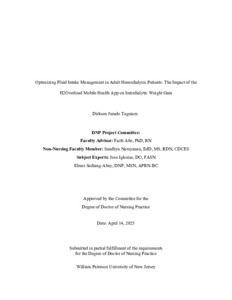Please use this identifier to cite or link to this item:
http://hdl.handle.net/20.500.12164/3510| Title: | Optimizing Fluid Intake Management in Adult Hemodialysis Patients: The Impact of the H2Overload Mobile Health App on Interdialytic Weight Gain |
| Authors: | Taguiam, Dirksen Jurado |
| Keywords: | Nursing;Fluid intake management;H2Overload app;Hemodialysis;Interdialytic weight gain;Mobile health;Patient adherence |
| Issue Date: | 2-Sep-2025 |
| Publisher: | William Paterson University |
| Abstract: | Fluid intake management is crucial for adult patients undergoing hemodialysis (HD) to prevent adverse health outcomes, including excessive interdialytic weight gain (IDWG). This study evaluated the impact of the H2Overload mobile health app on fluid intake management and IDWG among adult HD patients. Utilizing a pre-post mixed-method single-group design, 18 participants were recruited from Ocean Renal Associates in Toms River, New Jersey. The study assessed changes in adherence to fluid restrictions, perceptions of fluid management importance, and IDWG before and after a four-week intervention using the app. Quantitative results showed significant improvements in adherence (p < .001), perception of importance (p = .004), and understanding of fluid restrictions (p = .005). However, the intervention did not yield a statistically significant reduction in IDWG (p = .517). Qualitative feedback identified the app's user-friendly interface and helpful features but also highlighted challenges, such as the inability to track fluid-rich foods and editing entries. These findings suggest that while the H2Overload app enhances patient knowledge and attitudes toward fluid management, additional strategies are needed to translate these improvements into better clinical outcomes. Further research is warranted to explore the app's long-term efficacy and to enhance its functionality for better fluid intake tracking in adult HD patients. This study contributes to understanding the role of mobile health interventions in chronic disease management, emphasizing the need for tailored solutions to support fluid management in this vulnerable population. |
| URI: | http://hdl.handle.net/20.500.12164/3510 |
| Appears in Collections: | Theses & Dissertations |
Files in This Item:
| File | Description | Size | Format | |
|---|---|---|---|---|
| Taguiam_OptimizingFluidIntake.pdf | 1.1 MB | Adobe PDF |  View/Open |
Items in DSpace are protected by copyright, with all rights reserved, unless otherwise indicated.
